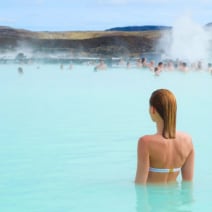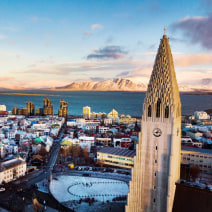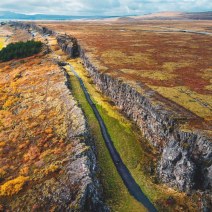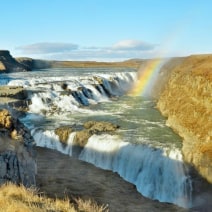Iceland Travel Guide
Known as the “Land of Fire and Ice,” Iceland is a land of extraordinary natural contrasts, offering a stunning mix of glaciers, volcanoes, geothermal springs, and dramatic landscapes. Its rich cultural heritage and vibrant modern society make it an unforgettable destination.
Iceland has a population of around 370,000 people, with Icelandic as the official language, though English is widely spoken. The capital city, Reykjavík, is a bustling hub of culture, history, and innovation, often serving as the gateway to the country’s breathtaking natural wonders.
From exploring the iconic Golden Circle, including Þingvellir National Park and Gullfoss waterfall, to relaxing in the world-famous Blue Lagoon, Iceland offers unique experiences for every traveller. Whether it’s chasing the mesmerising Northern Lights or marvelling at its rugged coastlines, the country promises unforgettable experiences at every turn.
We've outlined some general information that may be helpful to you when planning your next holiday to Iceland.

Time Zone & Currency
Iceland operates on Greenwich Mean Time (GMT) throughout the year with no daylight savings time. The currency is the Icelandic Króna (ISK).

Weather in Iceland
Iceland experiences mild summers and crisp, cold winters. Summers are ideal for exploring with long daylight hours, while winters offer a chance to witness the Northern Lights.

Reading For Your Trip To Iceland
Independent People by Halldór Laxness
Burial Rites by Hannah Kent
The Little Book of the Icelanders by Alda Sigmundsdóttir
Best time to go to Iceland
Iceland is a year-round destination, with each season offering its own charm. From May to September, enjoy extended daylight hours and the beauty of the midnight sun. October to March is perfect for experiencing the magical Northern Lights and the tranquillity of Iceland’s winter landscapes.
Top Tourist Attractions In Iceland
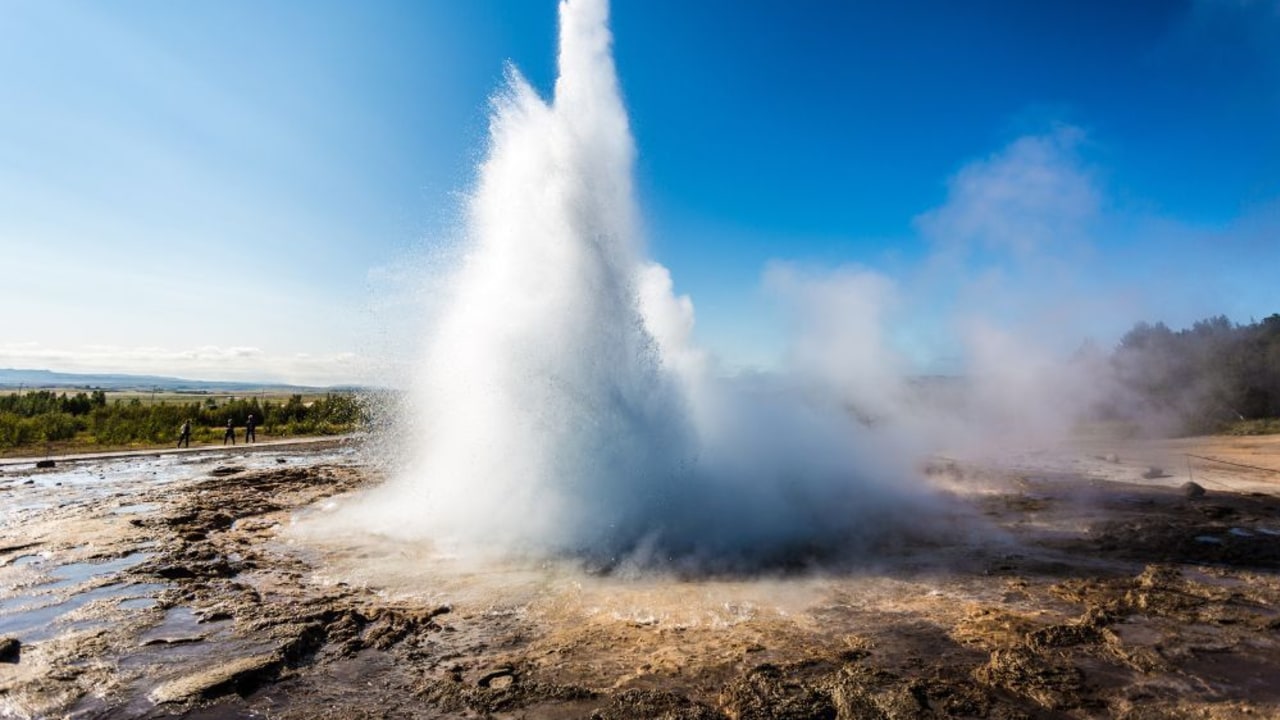
Top activities to see and do in Iceland
There is a wide range of activities to experience in the Land of Fire and Ice, where breathtaking natural wonders and stunning sights await.
Food and drink in Iceland
Icelandic cuisine is a unique blend of traditional Nordic influences, featuring fresh, locally-sourced ingredients. Some must-try dishes include:
- Lamb Stew (Kjötsúpa): A hearty soup made with lamb, root vegetables, and herbs, perfect for warming up on a cold day.
- Skyr: A traditional Icelandic dairy product similar to yoghurt, enjoyed plain or with berries and honey.
- Plokkfiskur: A comforting fish stew made with mashed potatoes, cod or haddock, and a creamy sauce.
- Icelandic Hot Dogs (Pylsur): Famous across the country, these are made from a mix of lamb, beef, and pork, often topped with crispy onions, ketchup, and mustard.
Iceland is also known for its clean, crisp water and unique beverages, including locally brewed craft beers and the traditional spirit, Brennivín. Local ingredients and sustainable practices make Icelandic dining an unforgettable experience.
Iceland Travel Guide FAQs
Can you give a brief history of Iceland?
Iceland has a rich and fascinating history shaped by its Nordic roots and geographical isolation. The island was first settled in the late 9th century by Norse Vikings and some Celtic settlers from the British Isles. These settlers established a unique culture and governance system, including the world’s oldest surviving parliament, the Alþingi, founded in 930 AD at Þingvellir.
For centuries, Iceland’s economy was primarily based on fishing and agriculture, but the island faced significant hardships due to harsh weather, volcanic activity, and isolation. In the late 19th and early 20th centuries, Iceland saw a period of national awakening, leading to independence from Denmark in 1944.
Today, Iceland is celebrated for its strong democracy, environmental stewardship, and unique cultural heritage, including sagas, folklore, and a vibrant modern society deeply connected to its stunning natural landscape.
Is it safe to tour Iceland?
Iceland is regarded as a safe place. However, at any destination popular with tourists there can be opportunists and pickpockets. It is wise to be vigilant and always take good care of your personal belongings. Make use of the safe at your hotel, and carry a photocopy of your passport when out and about.
Do I require a holiday visa to travel to Iceland?
All visitors to Iceland must carry a valid passport. EU citizens do not need a visa. Non-EU citizens should check their requirements. UK citizens can find further information by visiting www.gov.co.uk
Is Iceland expensive?
Iceland can be expensive. For everyday purchases, look out for Bónus, a basic supermarket chain where essentials can be bought at more realistic prices than in convenience stores. Quirky mementos of your visit and good prices can be found at the Kolaportið weekend flea market in Reykjavik’s Old Harbour area. Also worth checking out is the Red Cross thrift shop on Laugavegur Street. Look out for afternoon/evening ‘Happy Hour’ in bars and restaurants, for discounted beer and wines.
When is the best time to see the Northern Lights in Iceland?
Whilst sightings of the Northern Lights are subject to weather and atmospheric conditions and cannot be guaranteed, usually the best time to see the Northern Lights is between October and April.
What should I pack for my holiday in Iceland?
For travel outside the (cool-ish) summer period (June to September) it’s wise to wear plenty of warm layers. Winter temperatures vary between -10C and +10C and the wind chill factor cannot be underestimated. We recommend packing the following items for our trips to Iceland:
- Wind and rain-proof coat
- Wool socks and sturdy walking shoes / boots
- Warm hat, scarf & gloves
- Thick woollen jumpers and fleece lined clothing
- Bathing suit for the Blue Lagoon or other outdoor bathing venues
- Your reusable water bottle : the tap water in Iceland is excellent, and it’s free!
Useful Links
- For up-to-date information regarding entry into Montenegro please see: www.gov.uk
- Official Iceland Tourism Board: www.visiticeland.com
